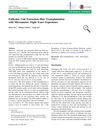 191 citations,
May 2018 in “British journal of dermatology/British journal of dermatology, Supplement”
191 citations,
May 2018 in “British journal of dermatology/British journal of dermatology, Supplement” Alopecia areata is likely an autoimmune disease with unclear triggers, involving various immune cells and molecules, and currently has no cure.
 131 citations,
November 1998 in “The journal of investigative dermatology/Journal of investigative dermatology”
131 citations,
November 1998 in “The journal of investigative dermatology/Journal of investigative dermatology” Skin grafts on mice can cause an immune response leading to hair loss, useful for studying human hair loss conditions.
 89 citations,
October 1996 in “Dermatologic Clinics”
89 citations,
October 1996 in “Dermatologic Clinics” Alopecia areata is likely caused by a combination of genetic factors and immune system dysfunction, and may represent different diseases with various causes.
 70 citations,
February 2015 in “Expert Opinion on Drug Discovery”
70 citations,
February 2015 in “Expert Opinion on Drug Discovery” Topical drugs and near-infrared light therapy show potential for treating alopecia.
 63 citations,
April 2018 in “Journal of the American Academy of Dermatology”
63 citations,
April 2018 in “Journal of the American Academy of Dermatology” Topical JAK inhibitors may help treat some skin conditions but need more research.
 55 citations,
October 2019 in “Dermatology and therapy”
55 citations,
October 2019 in “Dermatology and therapy” Drugs targeting the JAK/STAT pathway can improve atopic dermatitis but vary in effectiveness for vitiligo and alopecia areata, with generally mild safety concerns.
 42 citations,
April 2021 in “Journal of clinical pharmacology”
42 citations,
April 2021 in “Journal of clinical pharmacology” Baricitinib helps treat several diseases, including COVID-19, but has side effects and needs careful monitoring.
 37 citations,
January 1997 in “Clinics in Dermatology”
37 citations,
January 1997 in “Clinics in Dermatology” Hair problems are common and distressing for women, but increasing knowledge of treatments offers hope.
 30 citations,
June 2019 in “Frontiers in Endocrinology”
30 citations,
June 2019 in “Frontiers in Endocrinology” The document concludes that managing non-classical congenital adrenal hyperplasia in females requires personalized treatment, genetic counseling, and a team of specialists.
 29 citations,
January 2010 in “PubMed”
29 citations,
January 2010 in “PubMed” FUE hair transplants offer minimal scarring and are good for short hairstyles but are time-consuming and can be costly.
 27 citations,
October 1999 in “Experimental and Molecular Pathology”
27 citations,
October 1999 in “Experimental and Molecular Pathology” Stump-tailed macaque best for researching hair loss causes and treatments.
 23 citations,
March 2001 in “Clinics in dermatology”
23 citations,
March 2001 in “Clinics in dermatology” Alopecia areata involves immune response and gene changes affecting hair loss.
 17 citations,
May 2015 in “Aesthetic Plastic Surgery”
17 citations,
May 2015 in “Aesthetic Plastic Surgery” FUE hair transplantation using a micromotor is effective and gives natural results with few complications.
 17 citations,
July 1994 in “Journal of Dermatological Science”
17 citations,
July 1994 in “Journal of Dermatological Science” The cause of alopecia areata is likely a mix of genetics, immune system issues, and environmental factors, with more research needed to understand it fully.
 7 citations,
October 2017 in “Urologic Oncology: Seminars and Original Investigations”
7 citations,
October 2017 in “Urologic Oncology: Seminars and Original Investigations” Men with male pattern baldness have a higher risk of aggressive prostate cancer and benign prostatic hyperplasia.
 1 citations,
June 2022 in “International Journal of Health Sciences (IJHS) (En línea)”
1 citations,
June 2022 in “International Journal of Health Sciences (IJHS) (En línea)” Herbal hair oils help with hair problems and are safer than synthetic products.
 1 citations,
January 2010 in “DOAJ (DOAJ: Directory of Open Access Journals)”
1 citations,
January 2010 in “DOAJ (DOAJ: Directory of Open Access Journals)” Hair transplantation surgery has improved, becoming more popular and efficient, but patient dissatisfaction remains due to unrealistic expectations.
 April 2024 in “JMIR infodemiology”
April 2024 in “JMIR infodemiology” TikTok videos show that people with Lupus often discuss symptoms and their significant impact on mental health, face diagnostic delays, have mixed views on treatments, and feel isolated despite support.
 December 2023 in “International Research Journal of Modernization in Engineering Technology and Science”
December 2023 in “International Research Journal of Modernization in Engineering Technology and Science” Herbal hair oils help improve hair health and reduce problems like hair fall and dandruff with fewer side effects.

Lupus patients on TikTok feel isolated, face medical gaslighting, and prefer non-drug treatments.
 December 2021 in “Research Square (Research Square)”
December 2021 in “Research Square (Research Square)” M-CSF-stimulated myeloid cells can cause alopecia areata in mice.
 April 2019 in “Advances in Cosmetic Surgery”
April 2019 in “Advances in Cosmetic Surgery” The document concludes that ongoing medical therapy is crucial for preventing hair loss, and surgical options can restore hair, with future treatments for hair loss being promising.
 September 2017 in “Plastic and Reconstructive Surgery – Global Open”
September 2017 in “Plastic and Reconstructive Surgery – Global Open” Some migraine sufferers had no more headaches after getting a hair transplant.

Cosmetics can help with mild skin problems and daily care but must be used carefully to avoid skin irritation.
6 citations,
January 1981  January 2014 in “Jaypee Brothers Medical Publishers (P) Ltd. eBooks”
January 2014 in “Jaypee Brothers Medical Publishers (P) Ltd. eBooks” Bimatoprost may help with hair loss.
 November 2023 in “Heliyon”
November 2023 in “Heliyon” A woman got a serious eye infection after a hair loss treatment due to improper procedure.
 1 citations,
July 2017 in “Clinical research in dermatology”
1 citations,
July 2017 in “Clinical research in dermatology” Hair loss, known as Androgenetic Alopecia, is often caused by hormones and can be diagnosed using noninvasive techniques. Treatments include topical minoxidil and oral finasteride, with new treatments being explored. There may also be a link between this type of hair loss and heart disease risk.
1 citations,
March 2013 in “Clinical, cosmetic and investigational dermatology” The boy's hair loss was due to a hair-pulling disorder, not just a fungal infection.
 November 2023 in “Skin appendage disorders”
November 2023 in “Skin appendage disorders” Public interest in oral minoxidil for hair loss increased after a New York Times article.




























